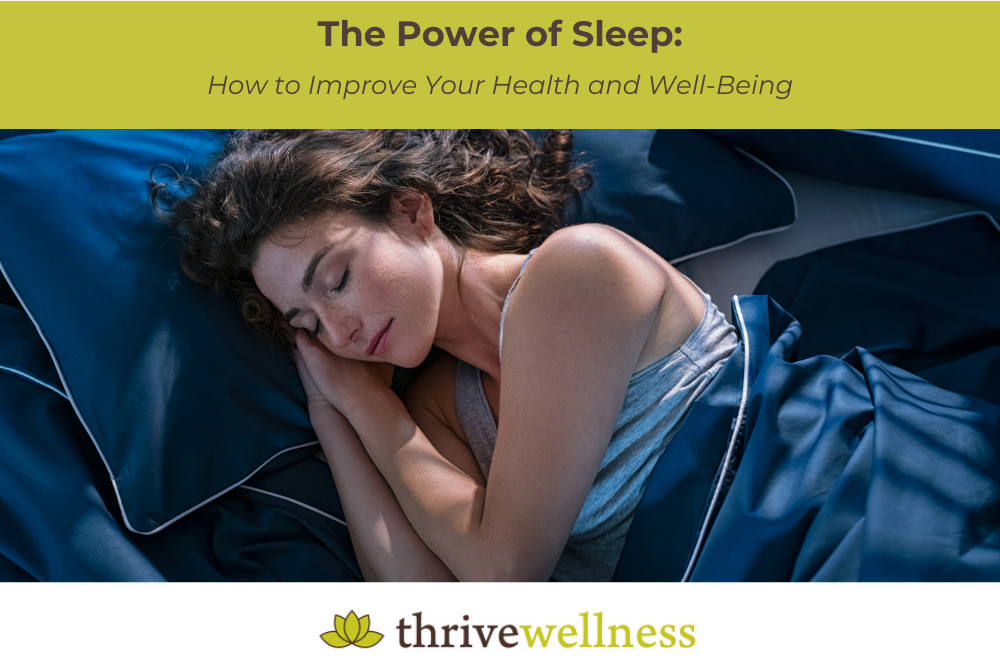
Why Sleep is Essential for Your Health
Sleep is one of the most crucial aspects of our well-being, yet it is often overlooked in our busy lives. Quality sleep is essential for physical and mental health, affecting everything from mood and cognitive function to immune strength and weight management. If you struggle with sleep, you’re not alone—millions of people experience sleep difficulties, which can lead to chronic health issues over time.
At Thrive Wellness, we understand the profound impact sleep has on your overall health. In this article, we will explore why sleep is essential, common sleep disorders, and practical strategies to improve your sleep quality.
The Importance of Sleep for Your Body and Mind
Getting enough rest is vital for:
- Brain Function & Memory – Sleep supports cognitive processes such as learning, concentration, and problem-solving. Poor sleep can lead to forgetfulness and difficulty focusing.
- Emotional Health – Sleep helps regulate mood and stress. Chronic sleep deprivation can contribute to anxiety, depression, and emotional instability.
- Immune Support – A well-rested body has a stronger immune system, helping to fight off infections and illnesses.
- Weight Management – Lack of sleep can interfere with hunger-regulating hormones, increasing cravings and making weight control more difficult.
- Heart Health – Quality sleep helps regulate blood pressure, reduces inflammation, and supports overall cardiovascular function.
Common Sleep Disorders and Their Impact
Many people struggle with sleep due to underlying sleep disorders. Some of the most common include:
1. Insomnia
- Difficulty falling asleep, staying asleep, or waking up too early.
- Often linked to stress, anxiety, depression, or lifestyle factors.
2. Sleep Apnea
- A condition where breathing repeatedly stops and starts during sleep.
- Can lead to daytime fatigue, high blood pressure, and other health issues.
3. Restless Leg Syndrome (RLS)
- An uncomfortable urge to move the legs, especially at night.
- Can make falling and staying asleep difficult.
4. Narcolepsy
- A neurological disorder that causes excessive daytime sleepiness and sudden sleep attacks.
5. Circadian Rhythm Disorders
- Occurs when the body’s internal clock is out of sync with external cues, often seen in shift workers and frequent travelers.
Tips for Better Sleep
If you struggle with sleep, there are several ways to improve your sleep hygiene and overall sleep quality:
1. Establish a Consistent Sleep Schedule
- Go to bed and wake up at the same time every day, even on weekends.
- This helps regulate your body’s internal clock.
2. Create a Relaxing Bedtime Routine
- Engage in calming activities like reading, meditation, or taking a warm bath.
- Avoid screens (phones, tablets, TVs) at least an hour before bed, as blue light can disrupt melatonin production.
3. Optimize Your Sleep Environment
- Keep your bedroom cool, dark, and quiet.
- Use blackout curtains, a white noise machine, or an eye mask if needed.
- Invest in a comfortable mattress and pillows.
4. Limit Stimulants and Heavy Meals Before Bed
- Avoid caffeine, nicotine, and alcohol in the evening.
- Large meals late at night can disrupt digestion and interfere with sleep.
5. Get Regular Exercise
- Engaging in physical activity during the day can improve sleep quality.
- However, avoid vigorous exercise too close to bedtime.
6. Manage Stress and Anxiety
- Try relaxation techniques such as deep breathing, yoga, or journaling before bed.
- Consider seeking professional guidance if anxiety or stress is interfering with your sleep.
7. Seek Professional Help When Needed
- If sleep problems persist despite lifestyle changes, consider consulting a healthcare provider for further evaluation and possible treatment.
Q&A: Your Sleep Questions Answered
Q: How many hours of sleep do I really need?
A: The recommended amount of sleep varies by age. Adults typically need 7-9 hours per night, while teenagers require 8-10 hours and children even more.
Q: Can naps make up for lost sleep?
A: While short naps (20-30 minutes) can boost alertness, they should not replace consistent nighttime sleep. Long or late naps may interfere with your ability to fall asleep at night.
Q: What is the best position to sleep in?
A: Sleeping on your back is ideal for spinal alignment and reducing acid reflux. Side sleeping can be beneficial for reducing snoring and sleep apnea, while stomach sleeping is generally discouraged as it may strain the neck and back.
Q: Is it normal to wake up multiple times during the night?
A: Brief awakenings are normal, but if you struggle to fall back asleep, it may indicate an underlying sleep issue or poor sleep hygiene.
Q: Can certain foods help improve sleep?
A: Yes! Foods rich in magnesium, melatonin, and tryptophan—such as bananas, almonds, turkey, and tart cherries—can support better sleep.
Q: Should I use sleep aids or melatonin supplements?
A: Melatonin supplements may help with temporary sleep issues, such as jet lag. However, long-term reliance on sleep aids is not recommended without medical supervision.
Q: When should I seek professional help for sleep problems?
A: If sleep disturbances persist for more than a few weeks and impact your daily life, it’s important to seek professional guidance. Conditions like sleep apnea, insomnia, or chronic fatigue may require medical intervention.
Take Charge of Your Sleep with Thrive Wellness
If you are struggling with sleep and looking for ways to improve your well-being, Thrive Wellness is here to help. Our expert team offers personalized wellness solutions to support your sleep health, improve energy levels, and restore balance in your life.
For more information or to schedule a consultation, contact us today:
Thrive Wellness
📍 Visit us at: 5005 Texas Street, Suite 303, San Diego, CA 92108
📞 Call us today: (619) 756-2630
🌐 Website: thrivewellness.com
Prioritize your sleep today, and wake up to a healthier, happier you!
